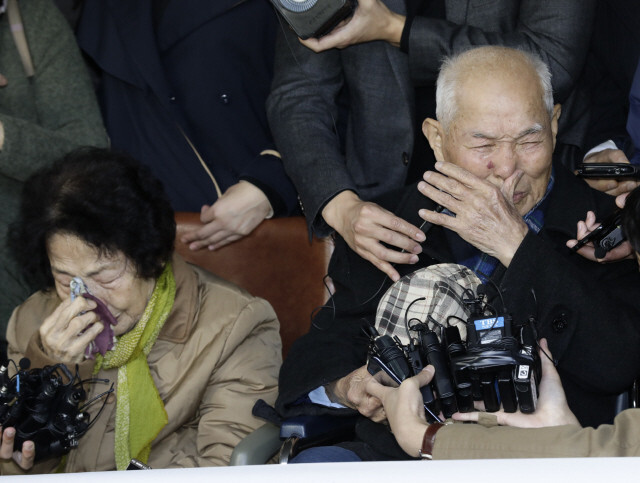hankyoreh
Links to other country sites 다른 나라 사이트 링크
[News analysis] What are Japan’s intentions behind prolonging the forced labor issue?

On Oct. 30 of last year, the South Korean Supreme Court ruled for the first time that Japanese companies must compensate victims of forced labor during Japan’s colonial occupation of Korea. But a year later, the Japanese government continues to maintain that the Supreme Court’s decision is a violation of international law.
Japanese Chief Cabinet Secretary Yoshihide Suga said on Oct. 30 that the issue of forced labor had been “completely and finally resolved by Japan and South Korea’s claims agreement.”
“The claims agreement is an international treaty, and one of the overarching principles of international law is that all government bodies — not only the executive but also the legislature and judiciary — are bound to comply with such treaties,” Suga said.
South Korean courts have seized assets of Japanese companies at the request of lawyers for the plaintiffs, who were conscripted into forced labor, and the Japanese government is watching closely to see whether those assets are liquidated.
Japanese newspaper the Asahi Shimbun reported that the Japanese government is considering taking “countermeasures” that would inflict a comparable amount of damage on Korea in the event of liquidation. Speaking on condition of anonymity, senior officials with Japan’s Ministry of Foreign Affairs said that enforcing the compensation ruling through liquidation of the assets would mean “crossing the Rubicon” and would “spell the end” of Korean-Japan relations.
But not even the Japanese government apparently wants bilateral relations damaged any further. Since Japan imposed export controls on South Korea in July, Korean tourism to Japan has plummeted, Japanese exports to South Korea have fallen, and Seoul has announced the imminent termination of its GSOMIA intelligence-sharing agreement with Japan — and all those developments are having a broad impact. Reports indicating that the Japanese government is working on its own plan for the forced labor issue appears to be connected to circumstances at home.
For now, the Japanese government appears to be taking a “wait and see” attitude. Japanese newspaper the Yomiuri Shimbun reported that Tokyo has resolved not to hold a summit with South Korea next month, preferring to watch for Seoul’s next steps. Events scheduled for next month include an ASEAN (Association of Southeast Asian Nations) summit in Bangkok and an APEC (Asia-Pacific Economic Cooperation) summit in Chile. The APEC summit, however, has been canceled by the Chilean president amid violent protests.
Meanwhile, a number of Japanese NGOs have released statements on the first anniversary of the forced labor ruling calling for the South Korea and Japanese governments to resolve the issue.
“We strongly call on the governments of Japan and South Korea and the companies involved to put their heads together and quickly find a solution for this issue,” a group called Civic Action for Resolving the Issue of Compulsory Mobilization and Reckoning with the Past said in a statement issued on Wednesday.
On Oct. 29, a Japanese academic organization called the Korean History Research Society, which has around 400 members both inside and outside of Japan, issued a statement of support for the Supreme Court’s ruling.
By Cho Ki-weon, Tokyo correspondent
Please direct comments or questions to [english@hani.co.kr]

Editorial・opinion
![[Column] Life on our Trisolaris [Column] Life on our Trisolaris](https://flexible.img.hani.co.kr/flexible/normal/500/300/imgdb/original/2024/0505/4817148682278544.jpg) [Column] Life on our Trisolaris
[Column] Life on our Trisolaris![[Editorial] Penalties for airing allegations against Korea’s first lady endanger free press [Editorial] Penalties for airing allegations against Korea’s first lady endanger free press](https://flexible.img.hani.co.kr/flexible/normal/500/300/imgdb/original/2024/0502/1817146398095106.jpg) [Editorial] Penalties for airing allegations against Korea’s first lady endanger free press
[Editorial] Penalties for airing allegations against Korea’s first lady endanger free press- [Editorial] Yoon must halt procurement of SM-3 interceptor missiles
- [Guest essay] Maybe Korea’s rapid population decline is an opportunity, not a crisis
- [Column] Can Yoon steer diplomacy with Russia, China back on track?
- [Column] Season 2 of special prosecutor probe may be coming to Korea soon
- [Column] Park Geun-hye déjà vu in Yoon Suk-yeol
- [Editorial] New weight of N. Korea’s nuclear threats makes dialogue all the more urgent
- [Guest essay] The real reason Korea’s new right wants to dub Rhee a founding father
- [Column] ‘Choson’: Is it time we start referring to N. Korea in its own terms?
Most viewed articles
- 160% of young Koreans see no need to have kids after marriage
- 2New sex-ed guidelines forbid teaching about homosexuality
- 3Presidential office warns of veto in response to opposition passing special counsel probe act
- 4How daycares became the most viable business for the self-employed
- 5[Column] Life on our Trisolaris
- 6Months and months of overdue wages are pushing migrant workers in Korea into debt
- 7[Guest essay] Maybe Korea’s rapid population decline is an opportunity, not a crisis
- 8Bills for Itaewon crush inquiry, special counsel probe into Marine’s death pass National Assembly
- 9OECD upgrades Korea’s growth forecast from 2.2% to 2.6%
- 10Gangnam murderer says he killed “because women have always ignored me”